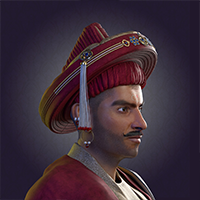Baji Rao I
Baji Rao I, born as Visaji, also known as Bajirao Ballal, was the 7th Peshwa of the Maratha empire. He is widely considered as the greatest Indian cavalry general. His relationship with his Muslim wife, a subject of controversy, has been adapted in Indian novels and cinema.
Baji Rao is the most celebrated personality after Shivaji in the history of the Maratha Empire. His achievements are establishing Maratha supremacy in South and political hegemony in North. During his 20-year career as Peshwa, he defeated Nizam-ul-Mulk at the Battle of Palkhed and responsible for establishment of Maratha power in Malwa, Bundelkhand, Gujarat, as redeemer of Konkan from Siddis of Janjira and liberator of western coast from the rule of Portuguese. Baji Rao was born into the Bhat family in Sinnar. His father, Balaji Vishwanath, was a Peshwa of Shahu and his mother was Radhabai Barve.[9] Baji Rao had a younger brother, Chimaji Appa, and two younger sisters, Anubai and Bhiubai. Anubai was married to Venkatrao Ghorpade of Ichalkaranji and Bhiubai was married to Abaji Naik Joshi of Baramati.[10]
Baji Rao spent his childhood in his father’s newly acquired fiefdom of Saswad. He and Chimaji were very close.[10] Baji Rao was inspired by the lives of Shivaji, Ramchandra Pant Amatya and Santaji Ghorpade.[11]
He was trained as a diplomat and a warrior under his father. Being born in a Brahmin family, his education included reading, writing and learning Sanskrit however, he did not remain confined to his books. Baji Rao displayed a passion for the military at an early age and often accompanied his father on military campaigns. Baji Rao had been on the expedition to Delhi in 1719 with his father and was convinced that the Mughal Empire was disintegrating and unable to resist northward Maratha expansion. Baji Rao succeeded his father, Balaji Vishvanath Bhat, as peshwa in 1720, establishing hereditary succession for the post. His tenure oversaw the expansion in power and influence of the peshwa as well as of the dominion of the Marathas, especially into Malwa (now in Madhya Pradesh) and Gujarat. Upon Shahu’s death in 1749, Baji Rao’s son and successor, Balaji Baji Rao, became the virtual ruler of the Maratha confederacy.
Baji Rao’s success was achieved through military conquest and effective diplomacy, including the formation of alliances with Rajput princes, the ability to defeat and extract compromises from the Nizam al-Mulk of Hyderabad, and the implementation of a tax regime over a vast area of former Mughal territory. Bajirao and Mastani’s love story is widely known in Maharashtra. Peshwa Bajirao I, the greatest leader of the Maratha empire after Shivaji, married Mastani, the daughter of Bundela king and an Iranian woman, in the face of family opposition, imprisonment, and crippling orthodoxy.
Their story is fondly remembered in Marathi plays, television serials, novels and films that have taken various liberties with the characters. As Marathi historical films tend towards hagiography, erring on the far side of caution, these adaptations have never caused any stir.

Baji Rao I
Date of Birth: 18 Aug 1700
Birth Place: hrivardhan
Proffession: Peshwa
Nationality: Indian
Death: 28 April 1740, Khargone


